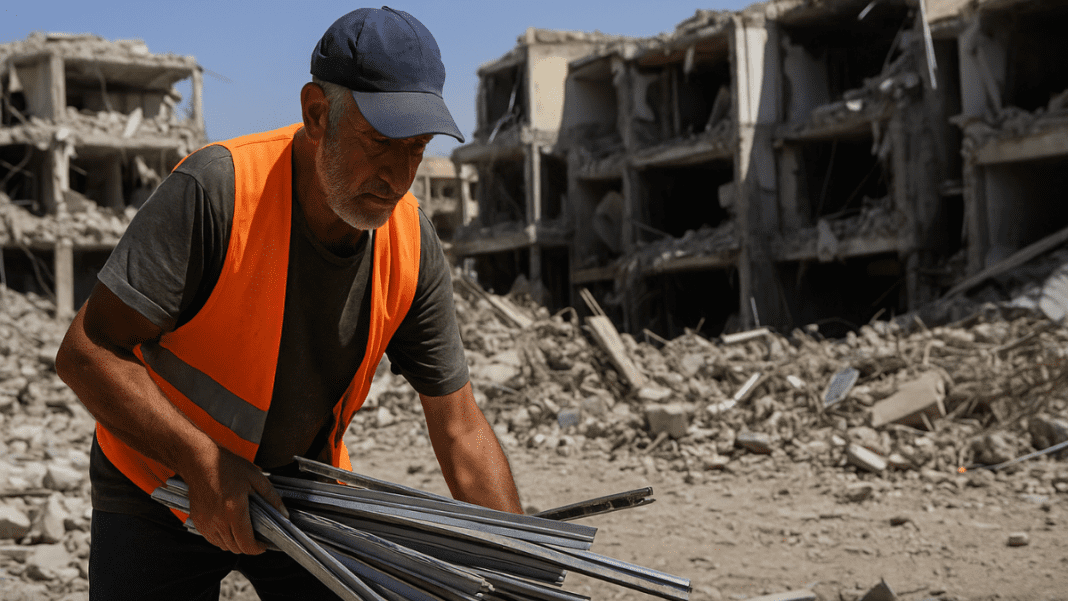In the aftermath of a devastating missile attack by Iran, neighborhoods across cities like Bat Yam, Rishon Lezion, and Tel Aviv are still struggling to recover. Buildings lie in ruins, families remain displaced, and streets are littered with debris. But amid the destruction, one Jaffa resident has found an unexpected way to earn a living.
Jaffa Resident Finds Aluminum in the Ashes
S., a man from Jaffa, walks daily through the wreckage wearing a bright orange vest. He collects aluminum scraps from damaged buildings and sells them to metal traders. “I look like a laborer, and no one asks questions,” he said in an interview with Israeli news outlet Walla.
S. makes anywhere between 500 and 2,000 shekels a day. On a good day, he collects enough metal to earn a sizable income. “I sell the aluminum for 4.5 shekels per kilogram,” he explains. “Once I’m done collecting, the traders arrive, weigh the load, and pay me on the spot. It’s a good, respectable daily wage.”
China Slams U.S. Over Iran Airstrikes—Calls Bunker Bomb Attack “Grave Violation of Sovereignty”
He focuses on collecting anything aluminum: window frames, door panels, and any other structural parts made from the lightweight metal. “The money is just lying on the ground,” he says, describing the rubble-strewn streets.
Jaffa Resident Seizes Opportunity in Missile-Hit Streets
While S. makes his rounds, others in the affected areas remain in limbo. Families whose homes were destroyed in the missile strikes still wait for word on compensation or a chance to return. Many now live in temporary shelters like hotels and absorption centers, with no clear timeline for returning to their homes.
Despite the heavy emotional toll on residents, S. believes he’s simply taking an opportunity. “I don’t break into homes or go through people’s things,” he insists. “If there’s no name, no address, and no one living there, I assume it’s up for grabs.”
He says that he’s not alone in this effort. “Others are doing it too. But what’s annoying is that there are stingy Israelis who prefer to collect on their own and sell it, instead of giving it to me.”
United States Imposes Sanctions on China-Iran Tech Network Supplying Nuclear Weapon Machinery
His comments drew attention, especially when he openly admitted that even displaced residents—those hit hardest by the attacks—are trying to gather and sell scrap to make ends meet. “Yes, but so what?” he responds. “They’re covered. They’ll get money from the state or whoever is responsible. I found treasure here. It’s not a crime—just a good way to make a living.”
Legal Loopholes and the Jaffa Resident’s Code
While collecting metal from bombed-out buildings might not appear criminal on the surface, the legal and ethical boundaries are blurry. S. insists that he operates by a personal code. “If I know who it belongs to, I ask. When they say no, I leave it. But if there’s no sign of ownership, I take it.”
This approach leaves room for debate. With streets still closed off and residents unable to reclaim their possessions, some argue that materials taken from these zones might still have rightful owners—even if they are not present. However, no formal charges have been reported against individuals collecting metal from the affected sites.
Israeli law typically prohibits theft of property, including construction materials, from both public and private areas. However, enforcement often depends on reported complaints, and in times of chaos following a disaster, clarity is often missing.
Ukraine Issues Fiery Endorsement of US Strikes on Iran — Demands Same Force Against Russia
Despite the gray legal area, S. continues his routine. He arrives early, roams through damaged streets, and gathers aluminum until his load is full. His orange vest helps him blend in with other workers and construction crews on the scene.
While he sees profit in the ruins, others see a reminder of trauma and loss. But S. stands firm in his belief that he’s simply using the situation to support himself. “This is not stealing. This is surviving. I didn’t cause this destruction. I’m just making the best out of what’s left behind.”

